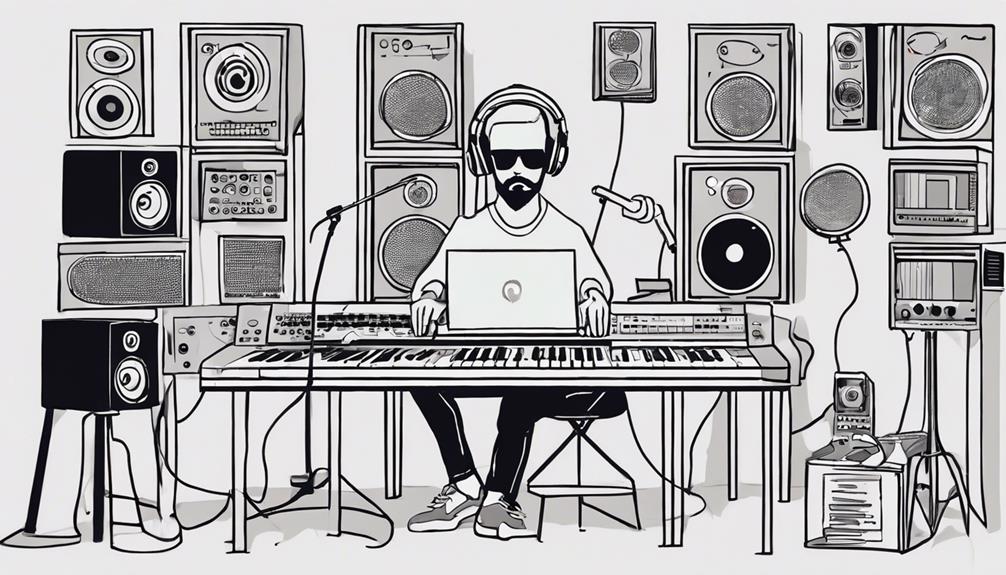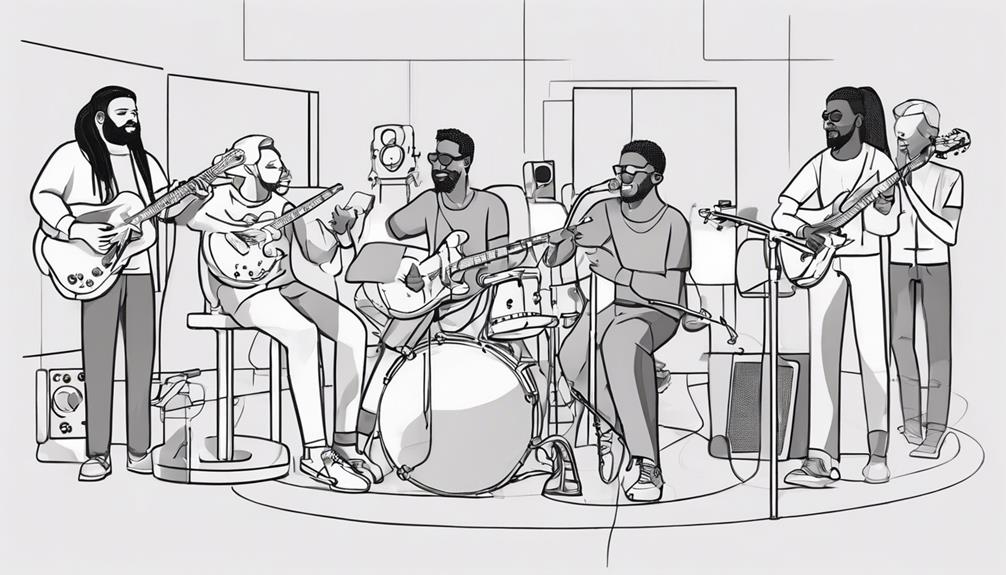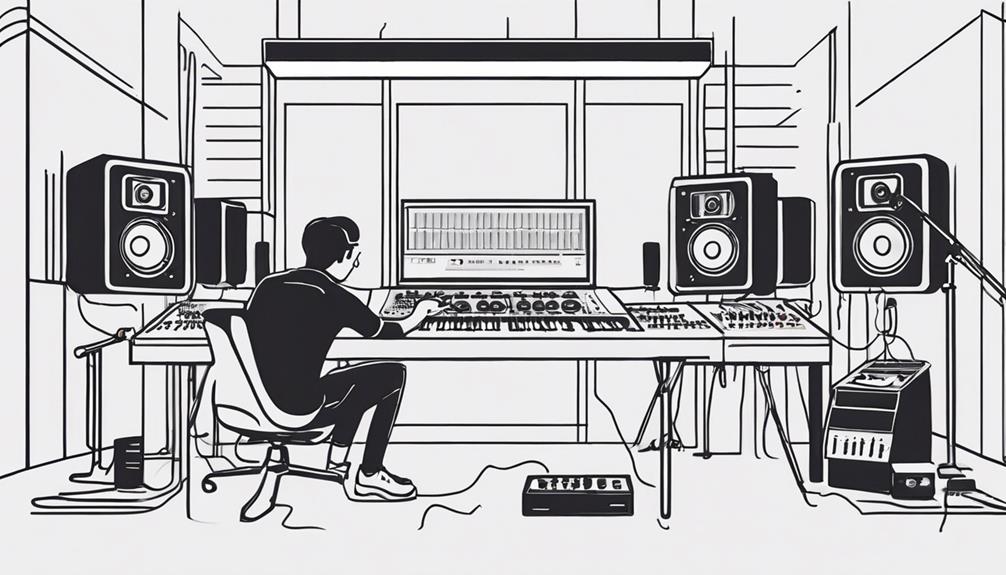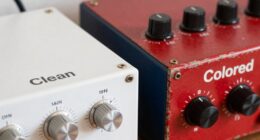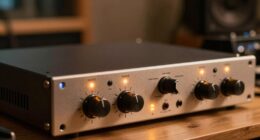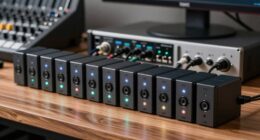To get a job in music production, get hands-on experience through internships at studios, learn from pros, and build a varied portfolio. Use industry-standard tools, network with key figures, keep learning online, improve marketing skills, follow trends, and tackle challenges. These tips lay the foundation for your journey into music production.
Key Takeaways
- Intern at recording studios for hands-on experience.
- Build a diverse portfolio showcasing skills.
- Network with industry professionals for connections.
- Stay updated on industry trends and technologies.
- Continuous training and education for career advancement.
Gain Practical Experience
To gain practical experience in music production, consider interning at recording studios or production companies. By interning, you can immerse yourself in the day-to-day operations of a professional studio, learning firsthand from experienced engineers and producers.
This hands-on experience will provide you with valuable insights into the technical aspects of music production, such as setting up equipment, recording techniques, and mixing processes.
During your internship, you'll have the opportunity to work on real projects, assisting in recording sessions, editing tracks, and observing the production workflow. This practical experience won't only enhance your technical skills but also allow you to build relationships with industry professionals and expand your network within the music production community.
Build a Strong Portfolio
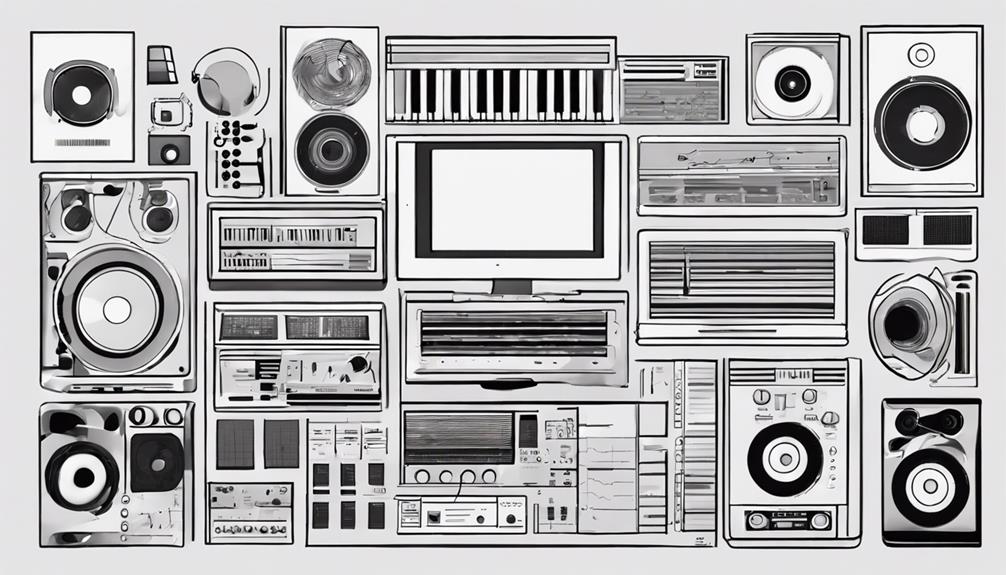
Consider diversifying your portfolio with a range of projects showcasing your music production skills across various genres and formats. Aspiring producers can include music production work, mixing, and mastering samples, and sound design projects to demonstrate their capabilities.
Showcasing versatility is key; include projects from different genres, styles, and formats to appeal to a wider audience of potential employers. Make sure to provide detailed descriptions and explanations for each project in your portfolio, highlighting your skills and creative process.
Organize your portfolio in a visually appealing and easy-to-navigate manner to make a strong impression on clients or employers. Regularly updating your portfolio with new and relevant work is essential to show continuous growth and development in your music production career.
A well-curated portfolio not only showcases your talent but also serves as a powerful tool to attract opportunities in the competitive music production industry.
Access Industry-Standard Equipment
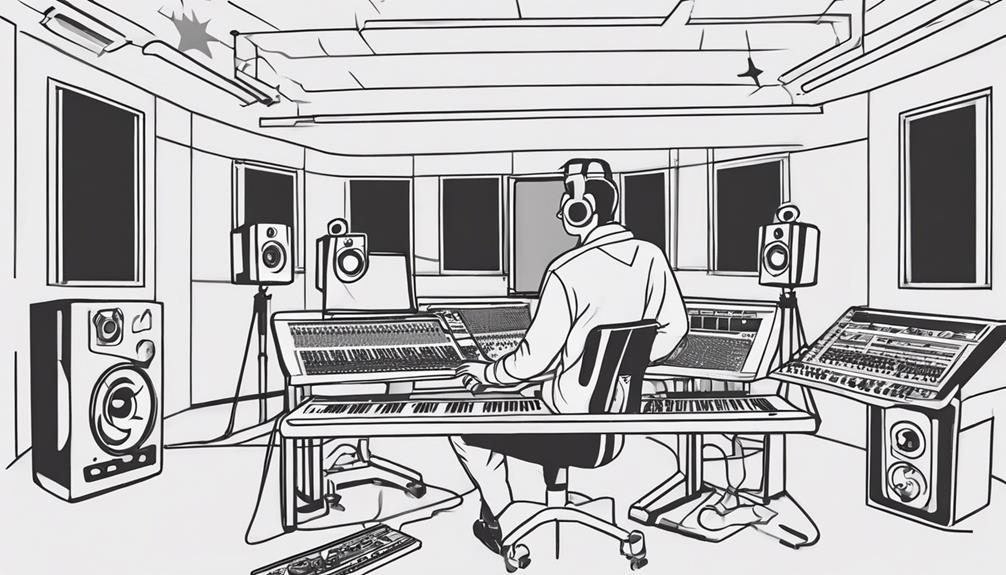
Provide access to industry-standard equipment for music production, including Digital Audio Workstations (DAWs) like Pro Tools, Ableton Live, and Logic Pro X. Access to high-quality microphones, audio interfaces, studio monitors, and MIDI controllers is vital for professional music production.
Understanding signal flow, audio processing, and studio acoustics is essential when working with industry-standard equipment. Many recording studios and production houses invest in top-tier gear to guarantee excellent sound quality and production efficiency.
Being familiar with popular plugins, virtual instruments, and hardware synthesizers can greatly enhance your proficiency in using industry-standard equipment. By having hands-on experience with these tools, you can develop the necessary skills to excel in music production.
Whether you're creating beats, recording vocals, or mixing tracks, having access to industry-standard equipment can elevate the quality of your work and help you stand out in the competitive music industry.
Network With Industry Professionals

Make meaningful connections in the music industry by networking with professionals who can help elevate your career in music production.
Attending music industry events, conferences, and workshops is a great way to meet industry professionals face-to-face. These events provide an excellent opportunity to engage with key figures in the music production field and build valuable connections.
Additionally, you can utilize online platforms such as LinkedIn to network with music producers and professionals from around the world. Joining music production communities and forums allows you to interact with like-minded individuals, share insights, and establish meaningful relationships within the industry.
Offering your assistance to established music producers or studios can also help you expand your network and gain valuable industry connections.
Lastly, attending local music production meetups and showcases can introduce you to potential mentors and collaborators who can further support your career growth in music production.
Continuous Training and Education
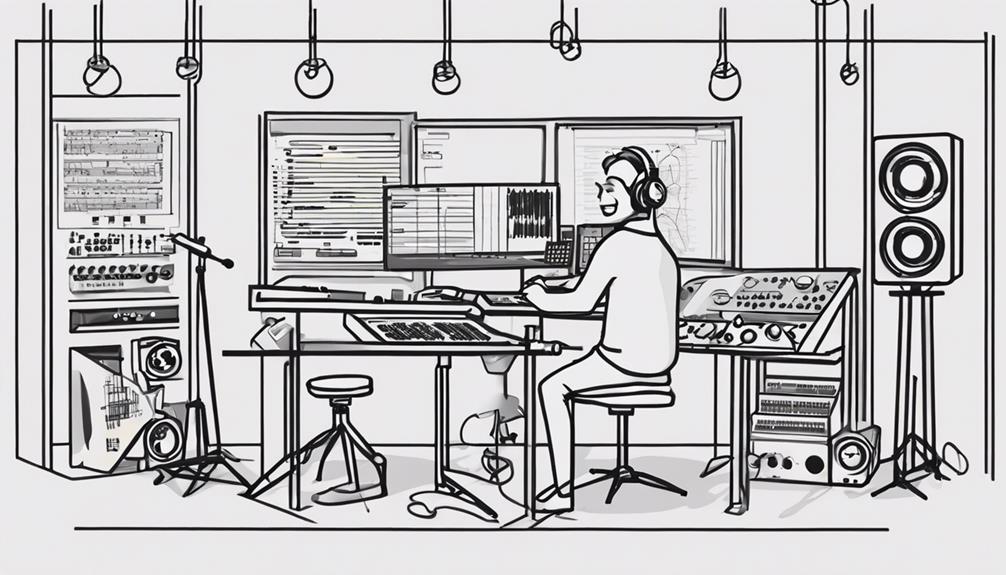
To further advance your career in music production, prioritize continuous training and education to enhance your skills and stay current with industry trends. Continuous training is key to staying relevant and competitive in the ever-evolving music production landscape.
Consider the following:
- Enrolling in online courses from platforms like Berklee Online and Soundfly can provide specialized training to take your music production skills to the next level.
- Utilizing educational resources such as LinkedIn Learning and YouTube can offer valuable insights into the latest trends and techniques in the music production industry.
- Keeping abreast of industry trends and technological advancements is essential for honing your craft and remaining competitive in the field of music production.
Explore Entry-Level Positions
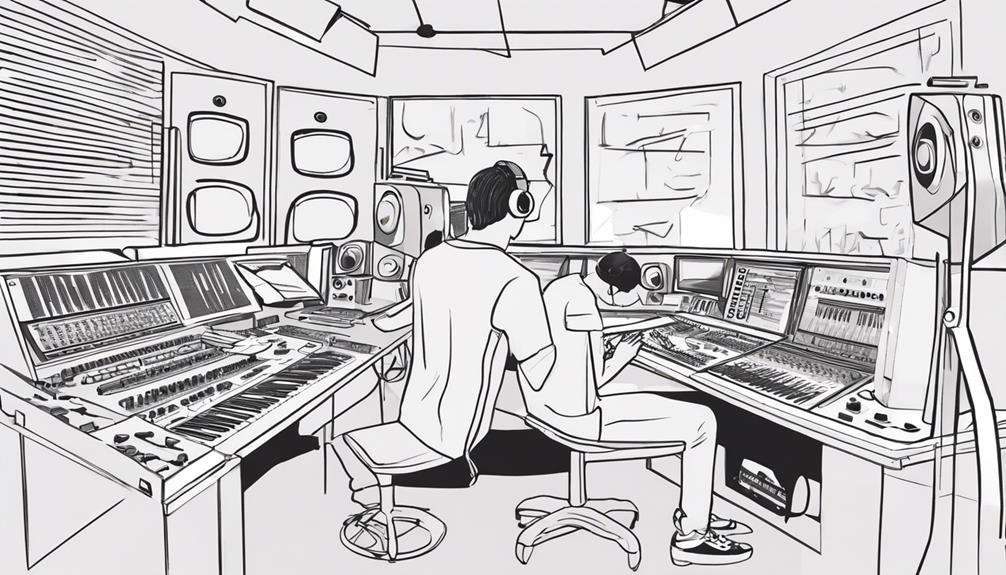
When starting out in music production, consider exploring entry-level positions like job shadowing opportunities, studio internships, and assistant roles. These positions offer hands-on experience in various music production settings and can help you develop essential skills in the industry.
Take advantage of these opportunities to kickstart your career in music production.
Job Shadowing Opportunities
Exploring entry-level positions through job shadowing offers aspiring music producers valuable hands-on experience in the industry. Job shadowing opportunities provide a glimpse into the day-to-day activities and responsibilities of music production professionals. This firsthand exposure allows individuals to assess if pursuing a career in music production aligns with their interests and goals. Additionally, shadowing experienced professionals can open doors to essential networking connections within the industry.
- Witnessing the creative process of producing music in a studio setting.
- Learning about different software and equipment used in music production.
- Observing how music producers collaborate with artists and other industry professionals to bring projects to life.
Internships in Studios
Consider applying for internships in studios as a valuable step towards gaining hands-on experience in music production. Studios often offer entry-level positions such as studio assistant or internships that provide aspiring music producers with the opportunity to learn directly from industry professionals.
These internships allow you to immerse yourself in the studio environment, learning about different equipment, software, and production techniques firsthand.
Working as a studio intern not only equips you with practical skills but also enables you to network with established professionals in the industry. By assisting with setting up equipment, organizing sessions, and supporting producers and engineers, you gain a deep understanding of how a studio operates and what's expected in a production setting.
This hands-on experience is invaluable for those looking to kickstart their careers in music production by gaining real-world exposure and building relationships that may lead to future job opportunities.
Assistant Roles Available
To progress in your journey towards a career in music production, it's worthwhile to explore the various entry-level assistant roles available in the industry. These positions offer valuable exposure to industry contacts and hands-on experience, setting a strong foundation for your future endeavors.
As an assistant, you'll find entry-level opportunities to work closely with experienced producers, helping with various tasks in recording studios or pre-production sound booths. Here are some key aspects of assistant roles in music production:
- Hands-on Learning: You'll gain practical experience by assisting in real-world music production environments.
- Access to Industry Tools: Working as an assistant provides access to high-end software and hardware, allowing you to enhance your technical skills.
- Portfolio Building: Assisting as a recording technician can help you build a robust portfolio, showcasing your capabilities as a music producer.
Securing one of these assistant roles is an important step towards establishing credibility and acquiring the necessary skills to progress in the music production field.
Stay Updated With Industry Trends
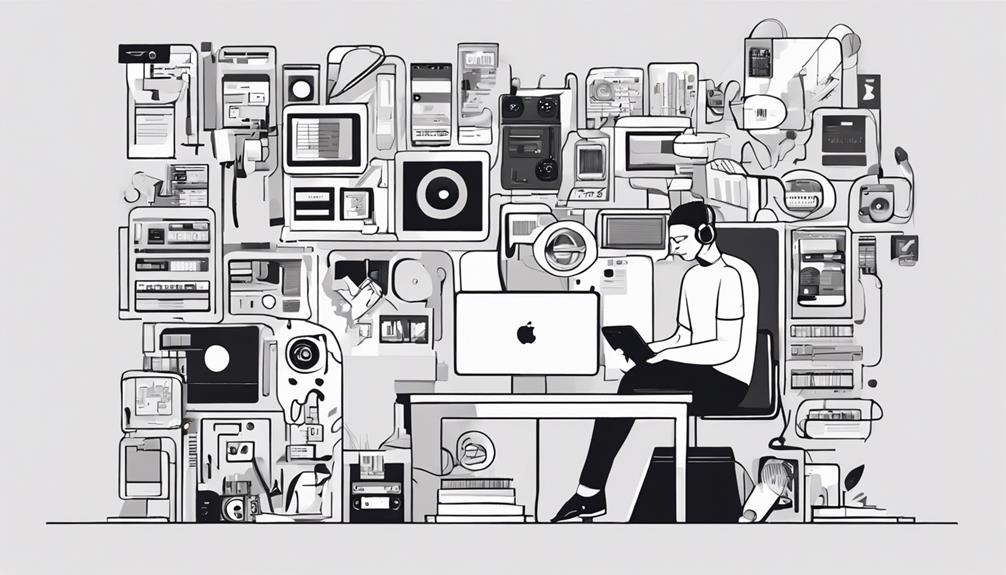
Keep yourself informed about the latest trends in music production by following industry publications like Billboard and Music Business Worldwide. These sources provide valuable insights into emerging technologies, industry shifts, and successful production techniques.
Attending music conferences such as NAMM and AES is another excellent way to stay updated on industry trends. Not only do these events offer opportunities to network with industry professionals, but they also showcase the latest advancements in production equipment and software.
Engaging with online communities like Gearslutz and Reddit's r/WeAreTheMusicMakers can also help you stay current with music production trends. These platforms allow you to discuss industry developments, share insights, and learn from fellow producers.
Additionally, subscribing to music production YouTube channels such as Pensado's Place and Produce Like A Pro can provide you with tutorials and industry news updates right at your fingertips.
Consider joining professional organizations like the Audio Engineering Society (AES) to access resources and events specifically focused on music production trends.
Enhance Skills Through Education
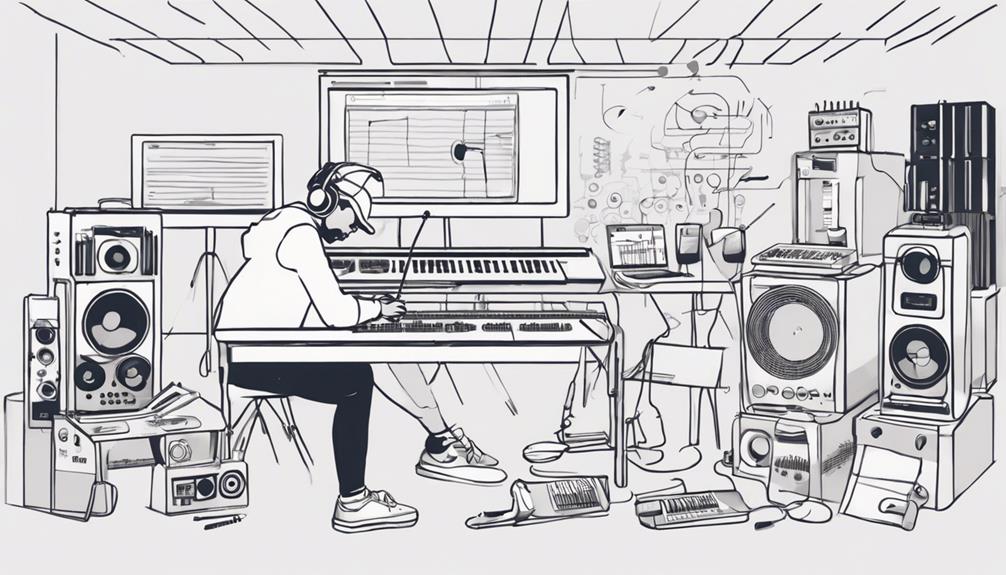
Enhance your skills in music production through formal education programs offered by institutions like Berklee College of Music or Full Sail University. By enrolling in these programs, you can:
- Interact with experienced music producers who can provide valuable insights and mentorship.
- Gain hands-on experience with cutting-edge music production software, hardware, and techniques.
- Deepen your understanding of music theory, audio engineering, and production skills to elevate your work as a music producer.
These educational opportunities not only equip you with technical proficiency but also help you build a strong foundation essential for success in the competitive music production industry.
Obtaining certifications in music production or audio arts can further validate your expertise and credibility to potential employers. Leveraging these educational resources and training programs will set you apart from others and enhance your prospects in the dynamic world of music production.
Develop Marketing Skills

You need to focus on branding to increase your visibility, networking to make valuable connections, and promotion to get more exposure in the music production industry.
Establishing a strong brand identity will help you stand out, while networking with professionals can open doors to job opportunities.
Promoting your skills and unique selling points will showcase your talent to potential clients and employers.
Branding for Visibility
Crafting a strong personal brand is essential for increasing visibility and standing out in the competitive music production industry. To enhance your branding for visibility, consider the following:
- Utilize Social Media: Engage with your audience and showcase your work on platforms like Instagram, Twitter, and YouTube. Interacting with followers and sharing behind-the-scenes content can help build a loyal fan base.
- Develop Consistent Branding: Maintain a cohesive brand identity across all your online platforms. Use consistent messaging, logos, and visuals to establish credibility and make a lasting impression on potential clients and collaborators.
- Showcase Your Unique Selling Points: Highlight what sets you apart from other music producers. Whether it's your production style, work ethic, or creativity, emphasizing your strengths can attract opportunities for growth and partnerships.
Networking for Connections
To expand your reach and establish meaningful connections in the music production industry, honing your networking skills is crucial. Networking plays a critical role in building relationships with industry professionals and potential employers.
Attending industry events, such as conferences and workshops, provides excellent opportunities to connect with like-minded individuals and enhance visibility within the music production field. These events offer a platform to engage in conversations, exchange ideas, and potentially form collaborations that can further your career.
In addition to physical events, leveraging online platforms like LinkedIn and professional forums can also aid in expanding your network. These platforms allow you to connect with a broader audience, showcase your work, and interact with potential collaborators in the music production industry.
Promotion for Exposure
Enhance your music production career prospects by mastering marketing skills to boost exposure for your work. Developing marketing skills is essential in promoting your music production services effectively.
Here are three key ways to enhance your exposure:
- Utilize Social Media Platforms:
Create a strong presence on platforms like Instagram, Facebook, and TikTok to showcase your music production portfolio and engage with a broader audience.
- Implement Email Marketing Strategies:
Build an email list of potential clients and industry contacts to regularly share updates, samples of your work, and special promotions.
- Focus on Branding and Content Creation:
Learn how to create a cohesive brand image for your music production services, and generate high-quality content that resonates with your target audience.
Overcome Industry Challenges
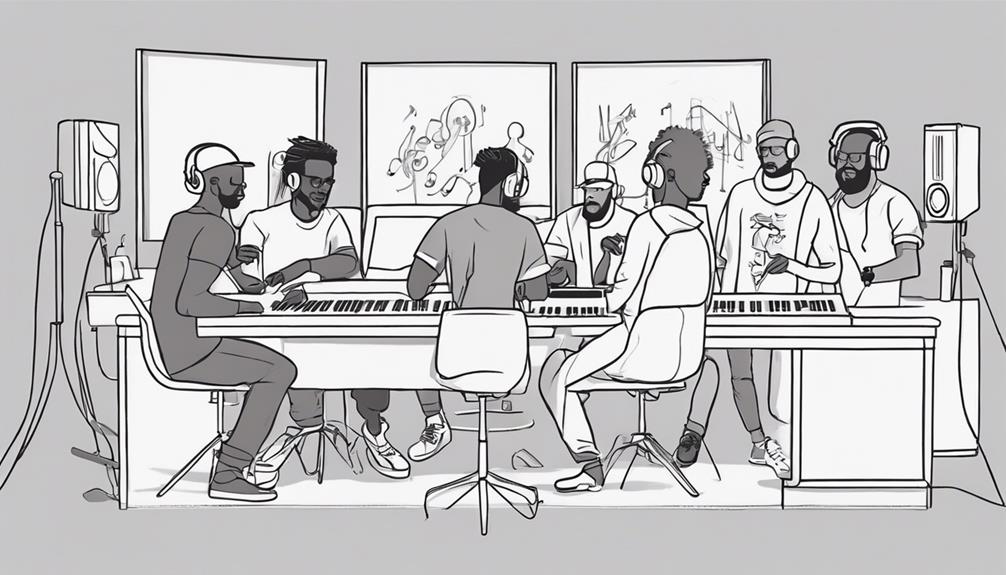
Build a solid support network and constantly seek opportunities to grow and adapt in the face of industry challenges in music production. When aiming to overcome these challenges and secure a job in music production, training your ear is essential. Developing a keen sense of sound and being able to identify nuances in music will set you apart in the competitive field.
Additionally, staying connected with industry professionals, attending music events, and engaging with online communities can provide valuable insights and opportunities for growth.
Internships at recording studios, production companies, or record labels offer hands-on experience and a chance to navigate real-world challenges. Keep yourself informed about industry trends, technological advancements, and emerging production techniques to stay relevant and competitive.
Collaborating with artists, musicians, and other producers not only expands your network but also exposes you to different styles and approaches, enriching your skill set. By embracing challenges as opportunities for learning and growth, you can position yourself for success in the dynamic world of music production.
Frequently Asked Questions
Is It Easy to Get a Job in Music Production?
Getting a job in music production isn't easy due to high competition. Networking, internships, and a strong portfolio are vital. Understanding industry trends and gaining experience are key. Persistence, passion, and continuous learning are essential.
How Do You Get Hired as a Music Producer?
To get hired as a music producer, you need to network, build a killer portfolio, secure internships, collaborate with artists, and stay updated on industry trends. These steps will boost your chances of landing your dream job.
How to Start a Career in Music Production?
To start a career in music production, gain hands-on experience through internships and assisting producers. Build a strong portfolio showcasing your skills, network with industry professionals, invest in industry-standard software, and consider formal education for credibility.
How Do I Get Work Experience in Music Production?
Want to get work experience in music production? Start by seeking internships, assisting local musicians, attending workshops, collaborating with others, and creating your own projects. It's like building a musical resume that speaks volumes.
Conclusion
So, now that you have all the insider tips on how to get a job in music production, it's time to put your knowledge into action.
Just like Emily, a recent graduate who followed these steps and landed a job at a top recording studio in LA.
By gaining practical experience, building a strong portfolio, and networking with industry professionals, you too can make your mark in the world of music production. Mastering the latest tools and staying updated with industry trends is equally vital to your success. With dedication and persistence, you can not only hone your craft but also make money through music production by collaborating with artists, licensing your tracks, or offering your services to brands and media companies. The key is to remain consistent and proactive in showcasing your unique sound to the right audience.
Good luck!

